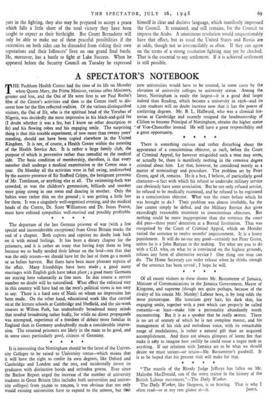The departure of the last German prisoner of war (with
a few special and inconsiderable exceptions) from Great Britain marks the end of a chapter. Both captors and captives no doubt look back on it with mixed feelings. It has been a dreary chapter for the prisoners, and it is rather an irony that having kept them so long because we so badly needed their labour on the land—not that that was the only reason—we should have let the last of them go a month or so before harvest. But there have been more pleasant aspects of the affair. Many friendships have been made ; a good many marriages with English girls have taken place ; a good many Germans are staying here voluntarily as free men. In due course a certain number no doubt will be naturalised. What effect the enforced stay in this country will have had on the men's political views is not easy to say. There is a hard core of Nazis on whom no impression has been made. On the other hand, educational work like that carried on at the lecture schools at Cambridge and Sheffield, and the six-week courses at Wilton Park, has undoubtedly broadened many minds that needed broadening rather badly, for while no direct propaganda was attempted, experience of a freedom of debate more familiar in England than in Germany undoubtedly made a considerable impres- sion. The returned prisoners are likely in the main to be good, and in some cases particularly good, citizens of Germany.


































 Previous page
Previous page